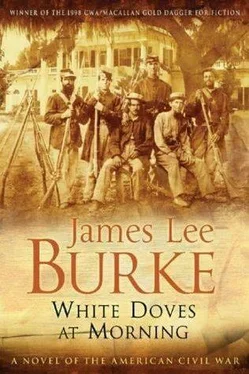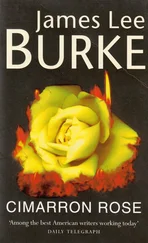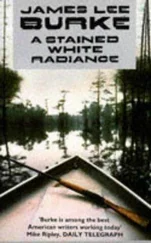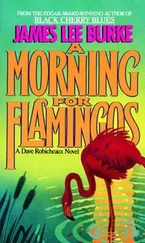They had shot and butchered a feral hog and great chunks of meat were now broiling on iron stakes driven into the ground by a roaring fire under a cypress tree. The crates of Henry and Spencer lever-action repeaters and ammunition were stacked in the wagons now and within a week they would be distributed all over southern Louisiana. If events turned out badly, the Yankees had cast the die, not these fellows in the swamp, he told himself.
But his thoughts were troubled. A guerrilla leader in a flop hat, a man named Jarrette, was squatting on his haunches by the fire, sawing at a shank of broiled meat, sticking it into his mouth with the point of his bowie knife. Some said he had ridden with Quantrill, a psychopath and arsonist whom Robert E. Lee had officially read out of the Confederate army. Jarrette spoke little, but the moral vacuity in his eyes was of a kind Robert Perry had seen in others, usually men for whom war became a sanctuary.
The other men were eating now from tin plates, passing around three bottles of clear whiskey someone had produced from under a wagon seat. Their faces were happy in the firelight, the whiskey glittering inside the bottles they tilted to their mouths. In this moment, in their mismatched pieces of uniform, they looked as though they had stepped out of a photograph taken on the banks of the Rappahannock River.
Then a man he recognized all too well walked out of the darkness and joined the others. His hair was greased and parted down the middle, his body egg-shaped and compact, his brow furrowed, the corners of his mouth downturned, as though he did not quite approve of whatever his eyes fell upon.
The egg-shaped, narrow-shouldered man sat down on a log and unfolded a sheet of paper and began reading off the names of people in the community whose activities were, in his words, "questionable or meriting further investigation on our part."
A two-shot nickel-plated derringer was stuck down tightly in the side of his belt.
"It looks like you've got the dirt on some right suspicious folk, Mr. McCain," Robert said.
" 'Dirt' is a word of your choosing, not mine," McCain replied. Robert sat down on the log next to him.
"Do you mind?" he asked, lifting the sheet of paper from McCain's hands. "Which outfit did you serve in?"
"I was exempted from service, although that was not my preference," McCain replied.
"How is it you were exempted, sir?" Robert asked.
"Provider of war materials and sole support of a family."
"Some used to call those fellows 'the Druthers.' They'd druther not fight," Robert said. Then he popped the sheet of paper between his hands and studied the list before McCain could reply. "Well, I see you have the name of Willie Burke down here. That disturbs me."
"It should. He's a nigger lover and he regularly insults the leadership of the Knights of the White Camellia," McCain said
"That sounds like Willie, all right. There's a little boy in town, a veteran of the 6th Mississippi, who says Willie told off Bedford Forrest. Can you believe that? May I see your gun?" Robert said.
Without waiting for an answer he lifted the derringer from McCain's belt. The nickel plate on it was new, unscratched, the pearl handles rippling with color in the firelight. Robert broke open the breech and looked at the two brass cartridges inserted in the chambers. He snicked the breech shut.
"Fine hideaway," he said, and tossed the derringer into the fire.
"What are you doing?" McCain said.
"No, no, don't get up," Robert said, resting his arm across McCain's shoulders. "Those are peashooter rounds in there. I doubt they could do any serious harm. Let's see what happens."
The derringer rested between two red-hot logs, which were crumbling into ash. One cartridge detonated and a bullet clattered through the top of a tree. The recoil flipped the derringer backward, burying it in a pile of soft ash.
"Don't know where it's aimed now, do we? I guess it's a bit like attacking across an open field against a rifle company that's set up inside a woods. You feel a terrible sort of nakedness, not knowing which fellow is about to park one in your liver," Robert said.
McCain pushed himself to his feet and jumped back into the darkness. The pistol popped again, this time driving the bullet into a log.
Robert stared silently into the flames, the list of names pinned between his arm and thigh. The other men formed a semicircle behind him, looking at one another, kicking at the ground, their food forgotten.
"How about a drink of liquid mule shoe, Robert?" one man said.
"I think I'll be having no more of this, but thanks just the same," he said.
He picked up the list of names and held it loosely in his fingers. The breeze puffed the fire alight so that he only had to lean forward slightly to drop the list onto the flames.
"You're our friend, but don't challenge us, Robert," another man said.
Robert flattened the sheet of paper on his thigh and removed a pencil stub from his pocket and blackened out one name on the list. Then he folded the paper and stuck it under the log.
"Good night and God bless you all," he said, rising to his feet. "But the man who brings injury to my pal Willie Burke will wish Billy Sherman had heated a train rail and wrapped it around his throat."
PERHAPS obsession had sawed loose his fastenings to a reasonable view of the world, Willie thought. Or maybe he was diseased and pathologically flawed, to the extent he was no longer repelled by death and mortality and defeat and was instead drawn to the grave, to leaf-strewn arbors and green-stained markers fashioned from field-stones, where the air was vaporous and tannic and the light always amber and the voices of friends rose from the ground, whispering lessons he wanted to reach out and cup in his hand.
And what a companion he had chosen for his return to Shiloh-a one-eyed, barefoot, British-born minstrel named Elias Rachet who constantly plucked at a banjo and twanged on a Jew's harp and wore his shoes tied around his neck, in case, as he said, "we have to walk in nasty water and through cow turds and such."
The two of them stood in the early morning haze at the bottom of an incline that was dotted with wildflowers. At the top of the rise was a clump of hardwoods, dark with shadow, the canopy denting in the breeze. Willie thought he heard the iron-rimmed wheels of caissons knocking across rocks and the popping of flags in the wind, the jingle of a bridle and the nicker of a frightened horse in the trees. He yawned to clear his ears and turned in a circle and saw only the vastness of the forests and the dark, metallic-blue dome of sky overhead.
"Jim Stubbefield died right where the gray stones are at. See, there's five of them, just like big Indian arrow points that's been pressed down in the ground," Elias said, pointing. He leaned over and spit tobacco in the grass, then plucked at his banjo. The tremolo from his strings seemed to climb into his voice. "Lordy, I can still hear all our boys yelling. Would you go through it again, knowing what you know now?"
"Maybe."
"I tell myself the same thing. I always reckon God forgives liars and fools, being as He made so many of us," Elias said.
Elias was slat-toothed when he grinned, his face crinkling with hundreds of tiny lines. He looked away at a tea-colored creek that coursed through the edge of a woods. The wrinkles in his face flattened and his solitary eye became a blue pool of sadness. "I kilt a boy out there in them trees maybe wasn't over fifteen. He came busting down the hill and I whipped around and shot him right through the chest. A little bitty yankee drummer boy, much like your friend Tige."
Elias sat down on a large rock, his legs splayed, and picked at his banjo. His callused feet were rimmed with mud, his mouth down-turned, his jug head silhouetted against the pinkness on the bottom of the horizon.
Читать дальше












